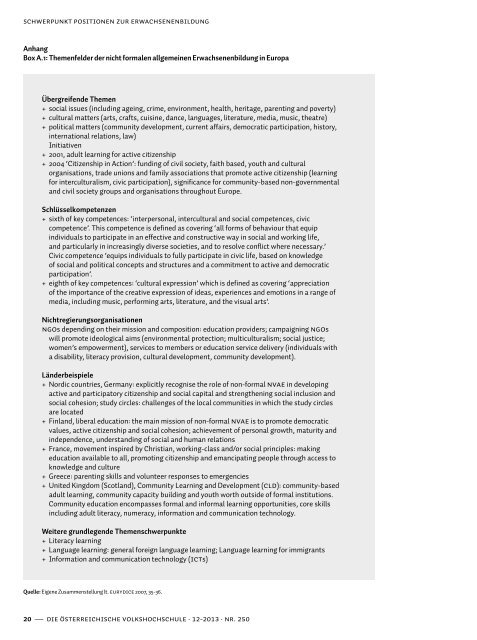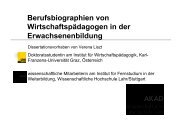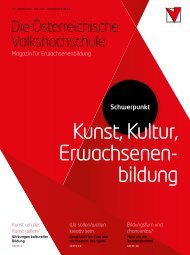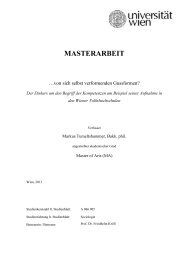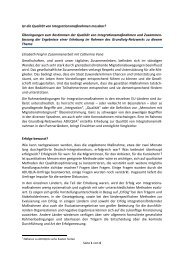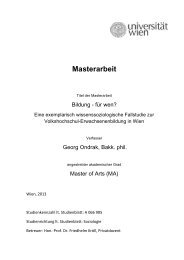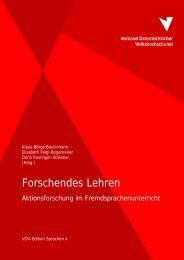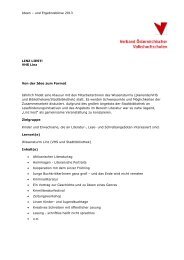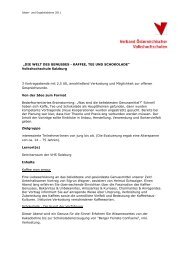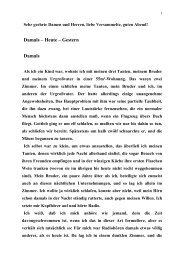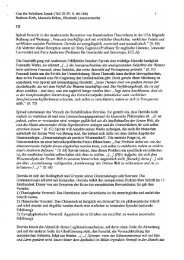zur Erwachsenenbildung
zur Erwachsenenbildung
zur Erwachsenenbildung
Erfolgreiche ePaper selbst erstellen
Machen Sie aus Ihren PDF Publikationen ein blätterbares Flipbook mit unserer einzigartigen Google optimierten e-Paper Software.
Schwerpunkt Positionen <strong>zur</strong> <strong>Erwachsenenbildung</strong><br />
Anhang<br />
Box A.1: Themenfelder der nicht formalen allgemeinen <strong>Erwachsenenbildung</strong> in Europa<br />
Übergreifende Themen<br />
+ social issues (including ageing, crime, environment, health, heritage, parenting and poverty)<br />
+ cultural matters (arts, crafts, cuisine, dance, languages, literature, media, music, theatre)<br />
+ political matters (community development, current affairs, democratic participation, history,<br />
international relations, law)<br />
Initiativen<br />
+ 2001, adult learning for active citizenship<br />
+ 2004 ‘Citizenship in Action’: funding of civil society, faith based, youth and cultural<br />
organisations, trade unions and family associations that promote active citizenship (learning<br />
for interculturalism, civic participation), significance for community-based non-governmental<br />
and civil society groups and organisations throughout Europe.<br />
Schlüsselkompetenzen<br />
+ sixth of key competences: ‘interpersonal, intercultural and social competences, civic<br />
competence’. This competence is defined as covering ‘all forms of behaviour that equip<br />
individuals to participate in an effective and constructive way in social and working life,<br />
and particularly in increasingly diverse societies, and to resolve conflict where necessary.’<br />
Civic competence ‘equips individuals to fully participate in civic life, based on knowledge<br />
of social and political concepts and structures and a commitment to active and democratic<br />
participation’.<br />
+ eighth of key competences: ‘cultural expression’ which is defined as covering ‘appreciation<br />
of the importance of the creative expression of ideas, experiences and emotions in a range of<br />
media, including music, performing arts, literature, and the visual arts’.<br />
Nichtregierungsorganisationen<br />
NGOs depending on their mission and composition: education providers; campaigning NGOs<br />
will promote ideological aims (environmental protection; multiculturalism; social justice;<br />
women’s empowerment), services to members or education service delivery (individuals with<br />
a disability, literacy provision, cultural development, community development).<br />
Länderbeispiele<br />
+ Nordic countries, Germany: explicitly recognise the role of non-formal NVAE in developing<br />
active and participatory citizenship and social capital and strengthening social inclusion and<br />
social cohesion; study circles: challenges of the local communities in which the study circles<br />
are located<br />
+ Finland, liberal education: the main mission of non-formal NVAE is to promote democratic<br />
values, active citizenship and social cohesion; achievement of personal growth, maturity and<br />
independence, understanding of social and human relations<br />
+ France, movement inspired by Christian, working-class and/or social principles: making<br />
education available to all, promoting citizenship and emancipating people through access to<br />
knowledge and culture<br />
+ Greece: parenting skills and volunteer responses to emergencies<br />
+ United Kingdom (Scotland), Community Learning and Development (CLD): community-based<br />
adult learning, community capacity building and youth worth outside of formal institutions.<br />
Community education encompasses formal and informal learning opportunities, core skills<br />
including adult literacy, numeracy, information and communication technology.<br />
Weitere grundlegende Themenschwerpunkte<br />
+ Literacy learning<br />
+ Language learning: general foreign language learning; Language learning for immigrants<br />
+ Information and communication technology (ICTs)<br />
Quelle: Eigene Zusammenstellung lt. EURYDICE 2007, 35-36.<br />
20 — DIE ÖSTERREICHISCHE VOLKSHOCHSCHULE · 12-2013 · NR. 250


